|
|
|
Sort Order |
|
|
|
Items / Page
|
|
|
|
|
|
|
| Srl | Item |
| 1 |
ID:
157586


|
|
|
|
|
| Summary/Abstract |
This article analyzes the length of interstate wars and the process of reaching a mutually acceptable bargaining solution. Rational choice scholarship has mainly sought to explain long wars in terms of commitment problems and private information. This article complements these rational choice perspectives by arguing that causal beliefs – a variable not considered by previous research – can also prolong wars by increasing expectations of battlefield performance and slowing down information updating. It illustrates the role of religiously based causal beliefs with the case of one of the longest interstate wars of modern time, the Iran–Iraq War of 1980–88. Even though commitment problems were present, they do not identify the root cause of Iran’s high expected utility of continuing the war, as religiously based causal beliefs played a more prominent role in prolonging the war. Religious causal beliefs constitute a real word mechanism that not only creates different priors about expected military capacity, but also slows down the process of updating beliefs, as battlefield events are not seen as credible information. Although the prevalence of religious conflicts has increased over time, the formation of beliefs and their effects on wars remains understudied when applying rational choice to real world conflicts.
|
|
|
|
|
|
|
|
|
|
|
|
|
|
|
|
| 2 |
ID:
138894
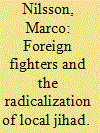

|
|
|
|
|
| Summary/Abstract |
Modern jihadism has experienced two distinct crises. The present study analyzes recent developments in jihadism, which can be seen in connection with efforts to solve the latest recruitment crisis of global jihad, and is based on comparative interviews with eight Swedish jihadists defined as foreign fighters. The study identifies three new trends evident in the interviews comparing jihadists active in Syria with those who fought in Afghanistan and Bosnia: socialization to global jihad, normalization of jihad, and an increasing use of the doctrine of takfir (i.e., ex-communication). This can be described as indicating the radicalization of local jihad, as the territorially based jihad, championed by Abdullah Azzam, and the global jihad of Osama bin Laden meet in the territorial realities of Syria and Iraq.
|
|
|
|
|
|
|
|
|
|
|
|
|
|
|
|
| 3 |
ID:
174555


|
|
|
|
|
| Summary/Abstract |
Hezbollah is a holistic network whose social, political, military and cultural dimensions are all parts of a discourse of resistance. Conducting a qualitative frame analysis of speeches by Hezbollah’s General Secretary Nasrallah, supported by interviews with Hezbollah leadership privy to its ideology, this study analyses the construction of muqawama (resistance). It argues that resistance is a complex social phenomenon, which can be manifested, for example, in the differences in how resistance is framed in varying contexts, often addressing different audiences. However, three unifying themes emerged from the frame analysis: diversity of resistance, normalisation of resistance and social dimensions of resistance.
|
|
|
|
|
|
|
|
|
|
|
|
|
|
|
|
| 4 |
ID:
160134


|
|
|
|
|
| Summary/Abstract |
The field of terrorism research has arguably long been characterized by a separation of the scholars from their subject of inquiry. Interviews can be used to bridge this chasm, but making contact with potential interviewees, conducting interviews, and analyzing the data pose unique challenges when conducting research into jihadists, especially active ones. This article focuses on the author's experience of interviewing both former and active jihadi foreign fighters. It is specifically intended to contribute to a better methodological understanding of conducting first-hand empirical research into jihadi foreign fighters and builds on fieldwork conducted in Sweden, Iraq, and Lebanon.
|
|
|
|
|
|
|
|
|
|
|
|
|
|
|
|
| 5 |
ID:
179841


|
|
|
|
|
| Summary/Abstract |
Jihadism is a complex social phenomenon that changes people, but not always uniformly. This article argues that cognitive and behavioral radicalization can be seen as a discursive journey or jihadiship involving (e)merging ideas, problems, and solutions that change with encounters with new circumstances—both material and immaterial. The differences observed between various generations of jihadists are one manifestation of this complexity. Especially in a jihadi group, the processes of radicalization are bound to continue and take new forms, compared with those experienced in the West. Another example of the complexity of jihadiship is that not only can radical ideas lead to radical behavior, but also radical behavior can increasingly give rise to radical ideas in jihadi groups.
|
|
|
|
|
|
|
|
|
|
|
|
|
|
|
|
| 6 |
ID:
159012


|
|
|
|
|
| Summary/Abstract |
This study analyzes how Kurdish women experience the violence and other consequences of the armed conflict raging between the PKK and the Turkish state. Interviews conducted in Istanbul, Ankara, and Diyarbakir suggest that Kurdish women experience the conflict both as members of an oppressed minority and as women. The study first focuses on identifying sources of conflict related stress that are specific to women, such as the need to be silent to protect their families, and then analyzes the strategies that Kurdish women use to deal with this stress as women, including networking and education.
|
|
|
|
|
|
|
|
|
|
|
|
|
|
|
|
| 7 |
ID:
147599
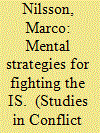

|
|
|
|
|
| Summary/Abstract |
This study analyzes the war against the Islamic State (IS), specifically on the front in northern Iraq, and the mental strategies that the Kurdish Peshmerga soldiers use to maintain their combat motivation. For this field study, dozens of soldiers of various ranks were interviewed and observed on three fronts outside of Mosul, Erbil, and Kirkuk in February 2014. While some mental strategies are nearly universal, others depend on the characteristics of the fighting force and the threat that they face. The article identifies five distinct mental strategies for dealing with the stress of fighting the IS: simultaneous dehumanization and humanization of the enemy, seeing a larger cause, use of humor, religious identity, and martyrdom. The findings suggest that factors beyond primary group cohesion, on which much previous research has focused, can play an important role in increasing soldiers’ fighting power.
|
|
|
|
|
|
|
|
|
|
|
|
|
|
|
|
| 8 |
ID:
187995
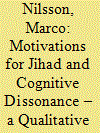

|
|
|
|
|
| Summary/Abstract |
This study is based on interviews with three former Swedish jihadists, and it uses cognitive dissonance theory to analyze how their motivations for jihad changed—from the early stages of radicalization to fighting as part of a jihadist group and finally leaving jihad. It argues that cognitive dissonance is a causal mechanism, alternative to empathy and collective relative deprivation, that can explain how individuals with collective identities can be motivated to opt for jihad. For none of the interviewees did fundamentalist Islam provide a gateway into jihadism, nor did they seem to use Islam as a mere justification for violent behavior. Cognitive dissonance can also shed light on why some jihadists have not been susceptible to further radicalization by accepting even more radical ideas.
|
|
|
|
|
|
|
|
|
|
|
|
|
|
|
|
| 9 |
ID:
160976
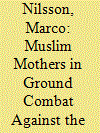

|
|
|
|
|
| Summary/Abstract |
This study analyzes the experiences and identities of Kurdish women fighting the Islamic State (IS) in northern Iraq as part of the Peshmerga Army. The case is especially interesting because these women have engaged in ground combat and because there is an empirical gap in knowledge, especially concerning Muslim women’s experiences as soldiers. Wars bring great destruction but can also catalyze social change. While seeking balance between their identities as good mothers and professional soldiers, many Kurdish women see their war participation as a chance to increase their agency and improve equality in society, as combat operations create a window of opportunity to change perceptions of women’s roles. Women soldiers still face prejudices and feel that they must prove their worth as fearless warriors in ground combat. However, interviewed soldiers said that they were not striving for equality but equivalency, stressing those qualities that women in particular can contribute in battle.
|
|
|
|
|
|
|
|
|
|
|
|
|
|
|
|
| 10 |
ID:
113755


|
|
|
|
|
| Publication |
2012.
|
| Summary/Abstract |
The systemic offense-defense theory argues that the security dilemma and the risk of war become doubly severe in offense-dominant eras in the state system. However, the theory assumes in support of its main argument that wars are shorter when offense has the advantage. This article empirically tests the expected connection between the systemic offense-defense balance and war duration. A statistical analysis of wars 1817-1992 disconfirms the theory's expectations. The article then draws different conclusions about the severity of the security dilemma when offense is dominant: both arms racing and the fear of aggression that the security dilemma thrives on should be less severe than offense-defense theorists assume.
|
|
|
|
|
|
|
|
|
|
|
|
|
|
|
|
| 11 |
ID:
161542
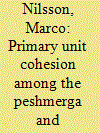

|
|
|
|
|
| Summary/Abstract |
This study analyzes the creation of primary unit cohesion among the Kurdish Peshmerga soldiers fighting the Islamic State in northern Iraq and among Hezbollah fighters active in Syria. For this comparative study, Kurdish soldiers were interviewed on three fronts outside Mosul, Erbil, and Kirkuk in February 2015 and May 2016, and Hezbollah fighters were interviewed in Lebanon in March 2016. In contrast to many studies’ depictions of unit cohesion as relating to shared experiences of training and battle, this study argues that the Kurdish soldiers also import into their units various ideas relating to Kurdish identity. These include ideas about nationalism and religion produced through discourses within the Kurdish military and society. However, Hezbollah seeks to minimize political damage in the multisectarian political context in Lebanon while conducting domestically contested military operations abroad. This has led to a downplaying of the sectarian aspects of the conflict, which could be imported from the Shia community to increase unit cohesion, and to an ideological framing of the conflict. The general ideas circulating in society and the political context therefore matter for the strategies that can be used to increase primary unit cohesion and soldiers’ fighting power.
|
|
|
|
|
|
|
|
|
|
|
|
|
|
|
|
|
|
|
|
|